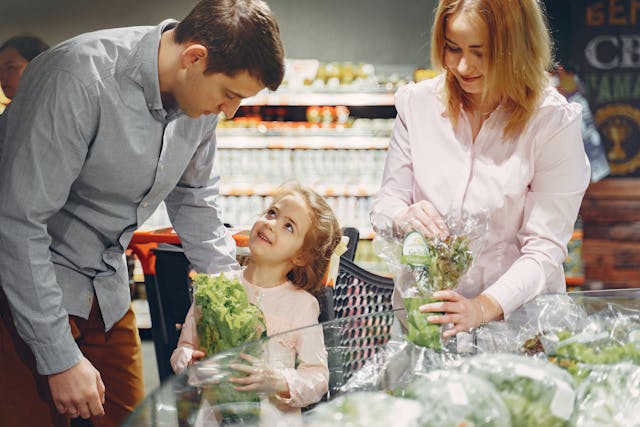Learn German through everyday situations!
Thank you for reading this post, don't forget to subscribe!This lesson, designed for beginners (A1 level), will help you master the basic German vocabulary and phrases necessary to navigate a supermarket. You will learn how to name food items, ask questions about food and prices, and communicate with shop assistants—all in German. This lesson is ideal for anyone looking to learn German as a beginner and apply it in real-life situations.
Table of Contents
Basic Vocabulary for Fruits
How to ask what someone likes to eat
Dialogue: In the Store
Vocabulary / Word List
Dialogue: In the Supermarket
Grammar: Verbs essen (to eat) and mögen (to like)
Questions about quantity and price
Dialogue: At the Cash Register
Weekly Specials – Prices
Tips for Learning
Practice Exercises
🍎 Basic Vocabulary for Fruits – German Vocabulary for Shopping for Fruits
Learn the basic German words for fruits that you will often encounter while shopping in the supermarket:
- der Apfel – apple
- die Orange – orange
- die Banane – banana
- die Erdbeere – strawberry
- die Traube – grape
- die Himbeere – raspberry
- die Mandarine – tangerine
- die Kiwi – kiwi
- die Zitrone – lemon
- der Pfirsich – peach
- der Obstsalat – fruit salad
Example sentence:
Wo finde ich die Äpfel? – Where can I find the apples?
Wo ist das Gemüse? – Where is the vegetables?
Entschuldigung, wo ist das Obst? – Excuse me, where is the fruit?
❓ How to ask what someone likes to eat – Useful Phrases in German
There are two ways to ask about someone’s food preferences in German:
- With the verb mögen (to like):
- Magst du Äpfel? – Do you like apples?
→ Ja, ich mag Äpfel. / Nein, ich mag keine Äpfel.
(Yes, I like apples. / No, I don’t like apples.)
- Magst du Äpfel? – Do you like apples?
- With the phrase gern essen (to like eating):
- Isst du gern Bananen? – Do you like eating bananas?
→ Ja, ich esse gern Bananen. / Nein, ich esse nicht gern Bananen.
(Yes, I like eating bananas. / No, I don’t like eating bananas.)
- Isst du gern Bananen? – Do you like eating bananas?
🛒 Dialogue in the Store – Practice German in Action
Practice the basic vocabulary and phrases with this shopping dialogue. Learn how to ask for price, quantity, and product location.
Customer: Guten Tag! – Good day!
Shop Assistant: Guten Tag! Kann ich Ihnen helfen? – Good day! Can I help you?
Customer: Ja, bitte. Wo finde ich die Äpfel? – Yes, please. Where can I find the apples?
Shop Assistant: Die Äpfel sind dort hinten, neben den Bananen. – The apples are back there, next to the bananas.
Customer: Danke schön! Und wo ist die Milch? – Thank you! And where is the milk?
Shop Assistant: Die Milch ist im Kühlregal, links neben dem Joghurt. – The milk is in the refrigerator, to the left of the yogurt.
Customer: Super, danke. Wie viel kostet ein Liter Milch? – Great, thanks. How much does one liter of milk cost?
Shop Assistant: Ein Liter kostet 1 Euro fünfzig. – One liter costs 1.50 Euros.
Customer: Ich nehme zwei Liter, bitte. – I’ll take two liters, please.
Shop Assistant: Sehr gut. Sonst noch etwas? – Very good. Anything else?
Customer: Nein, das ist alles. Danke. – No, that’s all. Thank you.
Shop Assistant: Gern geschehen. Einen schönen Tag noch! – You’re welcome. Have a nice day!
Customer: Danke, gleichfalls! – Thank you, you too!
Vocabulary / Word List
- der Kunde / die Kundin – customer (male / female)
- der Verkäufer / die Verkäuferin – shop assistant (male / female)
- die Äpfel – apples
- die Milch – milk
- das Kühlregal – refrigerator shelf
- Wie viel kostet …? – How much does … cost?
- Ich nehme … – I’ll take …
🗣️ Practice Exercises for Beginners: German Dialogues in the Store
Mia: Marko, magst du Obstsalat? – Marko, do you like fruit salad?
Marko: Obstsalat? Ja, aber ich mag keine Äpfel und keine Bananen. – Fruit salad? Yes, but I don’t like apples and bananas.
Mia: Was magst du denn? – What do you like then?
Marko: Orangen, Melonen, Kirschen, Trauben, Mangos, Kiwis — ich mag Obst! – Oranges, melons, cherries, grapes, mangoes, kiwis—I like fruit!
Mia: Na gut, ich esse die Äpfel und die Bananen. Und du isst … – Alright, I’ll eat the apples and bananas. And you’ll eat …
📚 Grammar: Verbs essen (to eat) and mögen (to like) in Everyday Situations
Verb essen (to eat) – Irregular conjugation:
- ich esse – I eat
- du isst – you eat
- er/sie/es isst – he/she/it eats
- wir essen – we eat
- ihr esst – you all eat
- sie/Sie essen – they/you (formal) eat
Verb mögen (to like) – Modal verb:
- ich mag – I like
- du magst – you like
- er/sie/es mag – he/she/it likes
- wir mögen – we like
- ihr mögt – you all like
- sie/Sie mögen – they/you (formal) like
🛍️ 7. Grocery Items in the Supermarket
- Dairy Products:
- die Milch – milk
- der Joghurt – yogurt
- der Käse – cheese
- Fruits and Vegetables:
- die Birne – pear
- die Tomate – tomato
- die Kartoffel – potato
- der Salat – lettuce
- Drinks and Other Items:
- der Saft – juice
- der Wein – wine
- die Cola – cola
- der Zucker – sugar
- der Honig – honey
- die Marmelade – jam
- der Fisch – fish
- der Reis – rice
- das Fleisch – meat
💶 Questions About Quantity and Price
Use the following phrases while shopping:
- Wie viel kostet ein Kilo Äpfel? – How much does one kilogram of apples cost?
- Brauchen wir noch Reis? – Do we need more rice?
- Haben wir noch Joghurt? – Do we have any yogurt left?
Units of quantity:
- eine Packung – a pack
- eine Flasche – a bottle
- eine Dose – a can
- ein Glas – a jar
- ein Kilo – a kilogram
🗨️ Dialogue: At the Cash Register
Customer: Ich hätte gern ein Kilo Äpfel. – I’d like one kilogram of apples.
Shop Assistant: Die Äpfel kosten 2,50 € pro Kilo. – The apples cost 2.50 € per kilogram.
Customer: Dann bitte ein Kilo. – Then, please, one kilogram.
Practice this kind of dialogue to make it easier for you to communicate at the checkout.
🏷️ Weekly Specials – Prices
Example prices in a supermarket (fictional prices):
- Birnen (1 kg) – 1.99 €
- Äpfel (1 kg) – 2.49 €
- Käse (100 g) – 2.39 €
- Tomaten (Dose) – 0.85 €
✅ Tips for Learning
Shopping in the supermarket is a great way to practice German through real-life situations. Use this guide to:
- Learn new words and phrases.
- Ask questions about prices and quantities.
- Practice dialogues in the store.
Continue practicing every day to feel more confident speaking German in everyday life!


